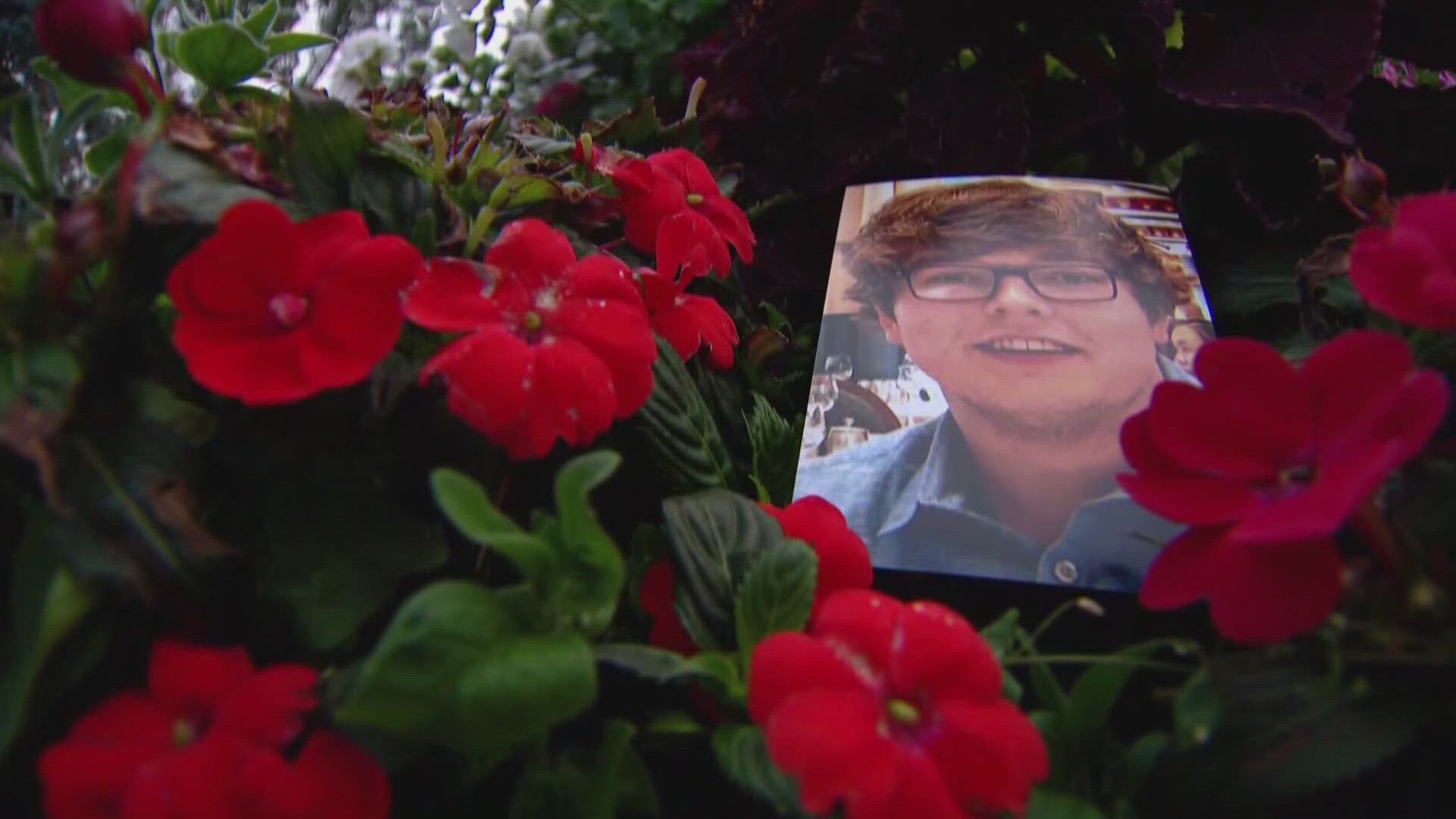CLEAR CREEK COUNTY, Colo. —
The trial opened Friday for one of the former Clear Creek County Sheriff's Office deputies charged in the death of 22-year-old Christian Glass.
Andrew Buen, the deputy who shot and killed Glass, is charged with second-degree murder, official misconduct and reckless endangerment. He was present in court Friday, as were Glass's parents. Both Sally and Simon Glass wore pink, their son's favorite color.
Fifth Judicial District Attorney Heidi McCollum argued in opening statements that that Buen’s actions that night were “aggressive, excessive and criminal." She said Glass was terrified and calling for help the night he was shot.
Defense attorneys for Buen painted a different picture, one of investigative oversight and a larger threat to law enforcement.
Carrie Slinkard, an attorney for Buen, suggested Glass was under the influence of drugs and was more of a threat to the responding officers than the prosecution describes.
Prosecutors say Glass called 911 for help after he got his car stuck on a boulder in Silver Plume in June 2022, and that he appeared to be experiencing a mental health crisis when several officers engaged with him for more than an hour. Body camera footage shows Buen broke the car's window, shot Glass with bean bag rounds and used a Taser on him before shooting him five times in the chest.
> WARNING: The following video contains content that may be disturbing to some viewers, including gunshots, violence and graphic language.
"[Buen] was so focused on the wrong thing that nearly everything he did that evening escalated the situation that led to Christian glass’ death," McCollum said in opening statements.
McCollum said Glass wasn’t a threat, but that he was suffering a mental health crisis. She reiterated Glass' offer made over the 911 call to throw any weapons out of the car once officers arrived.
McCollum said Glass spent the next 90 minutes in fear.
"He is not threatening any one of them," McCollum said.
Slinkard said she disagrees. She argued that Glass was not experiencing a mental health crisis, but that he was under the influence of drugs in a car full of weapons.
“They’re refusing to acknowledge that he was definitely high. But we don’t even know what he was high on because they didn’t bother to look into it," Slinkard said of McCollum and the prosecution team.
The defense focused on drug paraphernalia that was present in Glass' car, mentioning a half smoked joint and showing pictures of various accessories. It was this, and the knives and hammers that Glass had in the car, that presented a threat, she claimed.
"They're [Buen and his then-partner, Tim Collins] not jumping on the hood [of the car] to be scary and aggressive. They're trying to get this person, who is clearly mentally deteriorating because of the ingestion of drugs, out of the vehicle," Slinkard said. She spent much of the rest of her opening statement discussing the ways in which she believes the investigation fell short and arguing that Buen had no choice but to act.
“He [Buen] knows that shooting somebody with a firearm is a deadly threat. He knows that. And yet there was no other choice in that moment, in his mind, but to shoot Mr. Glass in order to protect that Chief from being stabbed by this knife that's being wielded,” Slinkard concluded.
Following opening statements, the jury heard testimony from two witnesses, the first being Paige Kincaid, one of the dispatchers who answered Glass' call that night.
Kincaid testified that Glass' call was designated a "motorist assist" for drivers in need of help. She also said that Glass was designated "clean and valid," meaning he had no prior warrants and was a valid driver.
The second was Kirby Lewis, assistant director of investigative units at the Colorado Bureau of Investigation's (CBI) Denver office. Lewis was the first CBI investigator on scene, saying he arrived after several officers had already left. He said he has investigated over 30 police involved shootings.
Lewis said he conducted one interview with Georgetown Marshal Randy Williams, one of the responding officers. He told the jury he assigned CBI Agent Derek Graham to be lead investigator on the case. Graham will be called to testify when trial resumes at 8:30 a.m. on Monday.
In November 2022, a Clear Creek County grand jury indicted Buen and his supervisor, former Clear Creek County deputy Kyle Gould, who wasn’t at the scene that night. According to court documents, Gould watched the encounter with Glass via a live-streamed body worn camera. He gave the order for Glass' driver's side window to be broken out.
The 5th Judicial District Attorney's Office offered plea deals to both former Clear Creek County deputies in September 2023.
Gould pleaded guilty in November to duty to report use of force by peace officers - duty to intervene.
He was sentenced to two years' unsupervised probation and ordered to pay a $1,000 fine. As part of the plea agreement, Gould withdrew his POST certification and cannot work as a police officer or security guard in Colorado ever again.
In November, the DA’s office charged all six other officers on scene the night of Glass’s death for failing to intervene.
In May 2023, the Glass family was awarded $19 million in a settlement agreement with Clear Creek County, the Colorado State Patrol, the Georgetown Police Department and the Idaho Springs Police Department – all departments with officers on scene that night. Among the many noneconomic terms of the settlement, Clear Creek County has implemented a crisis response team to respond to calls. It is the largest police misconduct settlement in Colorado history.
View a full timeline of events in this case below:
SUGGESTED VIDEOS: Christian Glass

